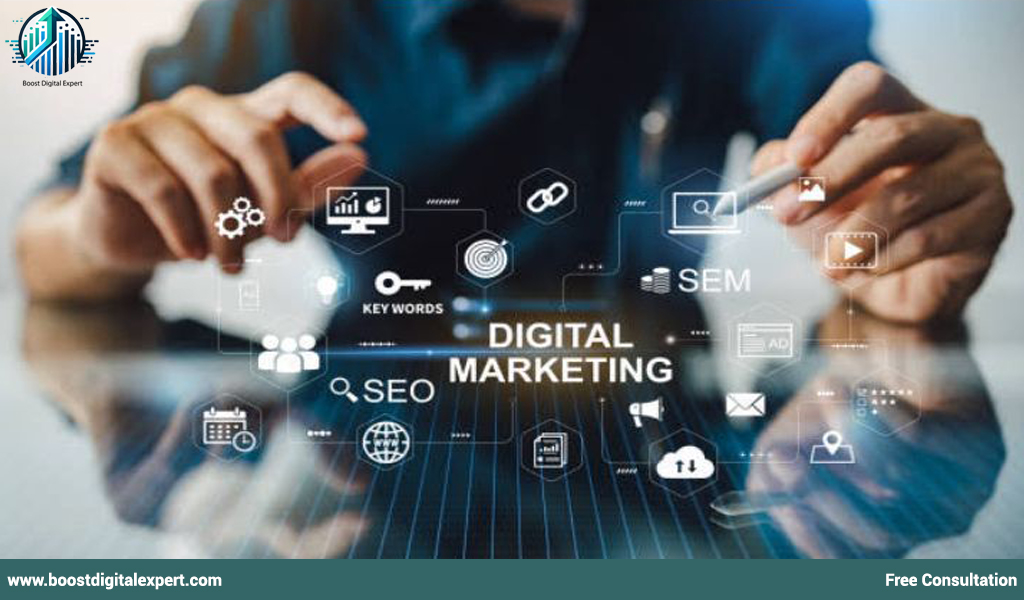In today’s digital marketplace, standing out is more crucial than ever. With countless brands vying for attention, having a compelling product or service is often not enough. That’s where Search Engine Optimization (SEO) comes into play. Beyond its technical aspects, SEO is a powerful tool that can significantly enhance your brand’s visibility and drive higher conversions. In this article, we’ll explore the intricate relationship between effective SEO strategies and their influence on both customer engagement and brand awareness. Join us as we uncover the secrets to leveraging SEO not just for traffic, but for transforming that traffic into meaningful interactions and lasting customer loyalty.
SEO, or Search Engine Optimization, is the art and science of enhancing your website to make it more attractive to search engines. When done correctly, SEO not only improves your site’s visibility but also increases the chances of converting visitors into paying customers.
The Evolution of SEO

Over the years, SEO has transformed from simple keyword stuffing to a complex strategy involving various elements. Initially, SEO was largely about manipulating search engines using keyword density and link farming. However, as algorithms have evolved, so too has the approach to SEO, emphasizing quality content and user experience. Today, SEO incorporates a comprehensive approach that includes technical optimization, quality content creation, and strategic keyword usage, adapting to the ever-changing algorithms of search engines.
What Is Search Engine Optimization (SEO) and How Does It Work?

Search engine optimization (SEO) is a multifaceted approach to improving a website’s visibility in search results across various search engines, including Google Search. Effective SEO strategies begin with comprehensive keyword research to identify valuable keywords with low competition that align with user intent and the target audience. Technical SEO ensures that search engines can crawl and index relevant pages efficiently, while tools like Google Analytics and Google Search Console provide insights into SEO performance, keyword rankings, and organic traffic.
A professional SEO company or agency can develop a custom SEO strategy, optimizing images, business listings, and multiple pages to enhance search engine rankings. SEO solutions work by helping search engines understand content, improving SEO rankings, and increasing search traffic. For e-commerce SEO, targeting the right keywords and optimizing for search intent is crucial. Additionally, international SEO expands reach, while paid search and Google Discover can complement organic efforts.
Key Components of SEO
SEO is a multifaceted discipline that involves several key components. These include on-page SEO, which focuses on optimizing individual web pages, and off-page SEO, which involves building backlinks and enhancing your site’s authority. Technical SEO ensures that search engines can crawl and index your site effectively, while local SEO targets local search queries to attract nearby customers. Together, these elements create a holistic SEO strategy that enhances your site’s performance in search engine results.
With the right SEO knowledge and campaign execution, businesses can achieve SEO success, driving more internet users to their site from leading search engines like Google’s search results and beyond. Partnering with an SEO services company ensures a data-driven approach, leveraging the latest SEO tools and industry best practices to outperform competitors and dominate search engine land.
The ROI of SEO
Investing in SEO can yield significant returns for businesses. Unlike paid advertising, which stops delivering results once you stop paying, SEO provides long-term benefits by organically improving your site’s ranking. An effective SEO strategy can lead to increased traffic, higher conversion rates, and improved brand credibility. The return on investment from SEO can be substantial, as it continues to deliver value by driving sustained, organic traffic and enhancing user engagement.
The Role of an SEO Agency
An SEO agency specializes in optimizing your website to rank higher on search engine results pages (SERPs). These agencies use various digital marketing techniques, including on-page SEO, PPC boosting, and content marketing, to improve your brand’s online visibility.
Search engine optimization (SEO) is a crucial strategy for businesses looking to improve their visibility on search engines like Google. Effective keyword research and the use of SEO tools help in identifying low competition keywords that can enhance rankings on search engine results pages (SERPs). Leveraging professional SEO services from an experienced SEO agency or SEO company can maximize a brand’s SEO success through data-driven strategies, including SEO optimization services, search engine marketing, and ecommerce SEO.
Choosing the Right SEO Agency
Selecting the right SEO agency is crucial for achieving your digital marketing goals. Look for agencies with a proven track record of success, demonstrated by case studies and client testimonials. It’s essential to choose an agency that understands your industry and can tailor its strategies to your specific needs. Transparent communication, clear expectations, and measurable outcomes are key factors in establishing a successful partnership with an SEO agency.
The Collaborative Process
Working with an SEO agency is a collaborative process that involves open communication and shared goals. The agency will conduct an initial audit of your website to identify areas for improvement and develop a customized strategy. Regular updates and reports ensure you are informed of progress and can see the tangible results of your efforts. This collaborative approach helps align the agency’s strategies with your business objectives, ensuring a successful SEO campaign.
Evaluating Agency Performance
To ensure your SEO agency delivers on its promises, it’s crucial to evaluate their performance regularly. Key performance indicators (KPIs) such as organic traffic growth, conversion rates, and search engine rankings can help measure success. Regular meetings and reports from the agency will provide insights into the effectiveness of their strategies. If the agency consistently meets or exceeds your expectations, it is likely delivering value and contributing to your digital success.
SEO Tools and Services
To optimize SEO, you need the right tools and services. Tools like Google Analytics, SEMrush, and Moz provide insights into website performance and help identify areas for improvement. SEO services, on the other hand, often include keyword research, link building, and technical SEO audits.
Using insights from platforms like Google Analytics and Google Search Console, an SEO team can refine their SEO campaign, improve the SEO performance, and align with best practices from Search Engine Land. Additionally, optimizing images and collaborating with other websites enhances content relevance, strengthening the target market connection and improving search engine rankings. In the ever-evolving SEO industry, maintaining strong SEO efforts ensures sustainable growth and better understanding of how search engines work, leading to impactful SEO solutions.
Essential SEO Tools
Several essential tools can significantly enhance your SEO efforts. Google Analytics provides valuable data on traffic sources, user behavior, and conversion rates. SEMrush and Moz offer comprehensive SEO analysis, including keyword research, backlink tracking, and site audits. These tools help identify opportunities for improvement and track the effectiveness of your SEO strategies, enabling data-driven decision-making and optimization.
Advanced SEO Services
Beyond basic SEO tools, advanced services can further boost your site’s performance. Technical SEO audits identify and rectify issues that may hinder search engine crawling and indexing. Professional keyword research ensures you target the most relevant and high-converting keywords. Link building services focus on acquiring quality backlinks from authoritative sites, enhancing your site’s credibility and search engine ranking.
Integrating SEO Tools and Services
Integrating SEO tools and services into your digital strategy can maximize their effectiveness. By combining the insights from tools like Google Analytics with the expertise of professional services, you can create a comprehensive SEO plan. This integration allows for continuous monitoring and adjustment of strategies, ensuring your site remains competitive and visible in search engine results. Regular collaboration between your team and service providers can lead to sustained improvements in site performance and visibility.
How SEO Influences Conversions
SEO is not just about getting traffic; it’s about converting that traffic into loyal customers. Here’s how SEO can boost your conversion rate:
Targeted Traffic
SEO helps drive targeted traffic to your website. By optimizing for the right keywords—those that your potential customers are searching for—you attract visitors who are more likely to convert.
Understanding User Intent
Understanding user intent is crucial for driving targeted traffic. By analyzing search queries, you can determine what potential customers are looking for and tailor your content to meet those needs. This involves creating content that addresses specific questions or problems, aligning with the searcher’s intent, and increasing the likelihood of conversion. User intent segmentation allows you to refine your SEO strategy, ensuring that the traffic you attract is more likely to result in conversions.
Effective Keyword Targeting
Effective keyword targeting involves identifying and optimizing for keywords that align with your business objectives and audience needs. Long-tail keywords, which are more specific and less competitive, often attract highly targeted traffic. By focusing on these keywords, you can increase the chances of converting visitors into customers. Regularly updating your keyword strategy ensures it remains relevant and continues to attract the right audience to your site.
Measuring Traffic Quality
To ensure your SEO efforts are attracting quality traffic, it’s essential to measure and analyze traffic data. Metrics such as bounce rate, time on site, and conversion rates provide insights into the quality of your traffic. High-quality traffic is characterized by engaged users who interact with your site and complete desired actions. By regularly monitoring these metrics, you can adjust your SEO strategy to improve traffic quality and increase conversion rates.
Improved User Experience
A key component of SEO is improving the user experience. This includes fast loading times, mobile-friendly design, and easy navigation. A positive user experience keeps visitors on your site longer, increasing the chances of conversion.
Website Speed and Performance
Website speed and performance are critical factors in user experience and SEO. Slow-loading pages can lead to high bounce rates, negatively impacting your site’s ranking and conversions. Optimizing images, leveraging browser caching, and using a content delivery network (CDN) can significantly improve site speed. A fast, responsive website enhances user satisfaction and increases the likelihood of visitors converting into customers.
Mobile Optimization
With an increasing number of users accessing the internet via mobile devices, mobile optimization is essential for SEO success. A mobile-friendly design ensures that your site is accessible and user-friendly on smartphones and tablets. Implementing responsive design techniques and optimizing mobile navigation can enhance user experience, reducing bounce rates and increasing conversions. Prioritizing mobile optimization ensures your site meets the expectations of a growing mobile audience.
Intuitive Navigation and Design
Intuitive navigation and design are crucial for keeping visitors engaged and guiding them toward conversion. A clear, logical site structure helps users find the information they need quickly and easily. Implementing user-friendly design elements, such as straightforward menus and prominent calls to action, enhances the user experience. By prioritizing ease of use and accessibility, you can increase the chances of visitors taking desired actions on your site.
Building Trust and Credibility
High-ranking websites are often perceived as more credible and trustworthy. SEO helps build authority in your industry, making potential customers more likely to choose your brand over competitors.
Establishing Authority
Establishing authority in your industry is a key benefit of effective SEO. By consistently producing high-quality, informative content, you position your brand as a trusted resource. Gaining backlinks from reputable sites further enhances your credibility, signaling to search engines and users that your content is valuable. Building authority through SEO not only improves your search rankings but also fosters trust among potential customers.
Leveraging Social Proof
Social proof, such as customer reviews and testimonials, plays a significant role in building trust and credibility. Encouraging satisfied customers to leave positive reviews can enhance your brand’s reputation and influence potential buyers. Displaying social proof prominently on your site and in search results can increase confidence in your brand, leading to higher conversion rates. Incorporating social proof into your SEO strategy reinforces trust and credibility with your audience.
Transparency and Authenticity
Transparency and authenticity are vital for building trust and credibility through SEO. Providing clear, honest information about your products, services, and business practices fosters trust among potential customers. Authentic content that reflects your brand’s values and mission resonates with audiences, strengthening your relationship with them. By prioritizing transparency and authenticity, you can enhance your brand’s reputation and encourage conversions.
How SEO Enhances Brand Visibility
SEO also plays a significant role in boosting brand visibility, which is crucial for long-term success.
Increased Brand Awareness
When your website ranks high on search engines, more people see your brand. Even if they don’t click on your site, repeated exposure to your brand name increases awareness and familiarity.
The Power of SERP Presence
Achieving a prominent position on search engine results pages (SERPs) significantly enhances brand visibility. Even if users don’t click on your site, appearing on the first page of results increases brand recognition. This repeated exposure reinforces your brand’s presence in the minds of potential customers, creating familiarity and trust. A strong SERP presence is a powerful tool for building brand awareness and credibility.
Leveraging Featured Snippets
Featured snippets, or “position zero” results, offer an opportunity to increase brand visibility and authority. By optimizing your content to appear in featured snippets, you can capture the attention of searchers and provide immediate value. Featured snippets enhance your brand’s visibility and demonstrate expertise, encouraging users to engage with your content. Successfully leveraging featured snippets can significantly boost your brand’s online presence and credibility.
Brand Consistency Across Channels
Maintaining brand consistency across all digital channels reinforces your brand’s identity and visibility. Consistent messaging, visuals, and tone help establish a cohesive brand image, strengthening recognition and trust. By aligning your SEO efforts with your broader branding strategy, you can ensure that your brand remains prominent and memorable. Consistency across channels is essential for maximizing brand visibility and creating a unified brand experience.
Content Marketing and Branding
Content marketing is a powerful component of SEO. By creating valuable, relevant content, you not only improve your SEO but also establish your brand as a thought leader in your industry.
Creating High-Value Content
Creating high-value content is essential for effective content marketing and branding. Content that addresses the needs and interests of your audience positions your brand as a valuable resource. By providing informative, engaging content, you can attract and retain visitors, fostering brand loyalty. High-value content enhances your SEO efforts and reinforces your brand’s reputation as an industry leader.
Storytelling and Brand Narrative
Storytelling is a powerful tool for conveying your brand’s narrative and connecting with your audience. By sharing authentic stories that reflect your brand’s values and mission, you can create emotional connections with customers. Storytelling enhances your content marketing strategy, making your brand more relatable and memorable. A compelling brand narrative strengthens your brand identity and fosters deeper engagement with your audience.
Building a Content Ecosystem
Building a content ecosystem involves creating a diverse range of content that supports your SEO and branding efforts. From blog posts and articles to videos and infographics, a variety of content formats can engage different audience segments. A well-rounded content ecosystem ensures that your brand remains visible and relevant across multiple platforms and channels. By continuously producing and promoting high-quality content, you can enhance your brand’s visibility and authority.
The Role of Social Media
Social media is an integral part of a comprehensive SEO strategy. Engaging content shared on social platforms can drive traffic to your website and enhance brand visibility. Plus, social signals—likes, shares, and comments—can indirectly influence your SEO rankings.
Social Media and SEO Synergy
Social media and SEO work together to enhance brand visibility and engagement. Sharing content on social platforms increases its reach and potential for backlinks, indirectly boosting SEO. Social media also provides valuable insights into audience preferences and behavior, informing your SEO strategy. By leveraging the synergy between social media and SEO, you can amplify your brand’s online presence and drive traffic to your site.
Engaging with Your Audience
Engaging with your audience on social media is crucial for building relationships and enhancing brand visibility. Responding to comments, sharing user-generated content, and participating in conversations demonstrate your brand’s authenticity and accessibility. Active engagement on social media fosters a sense of community and loyalty among your followers. By prioritizing audience interaction, you can strengthen your brand’s visibility and reputation.
Measuring Social Media Impact
To assess the impact of social media on your SEO efforts, it’s essential to measure key metrics such as engagement rates, referral traffic, and social shares. These metrics provide insights into how your social media activities influence brand visibility and audience engagement. By analyzing social media data, you can refine your strategy to maximize its effectiveness in supporting your SEO goals. Regularly measuring social media impact ensures your efforts contribute to increased brand visibility and online success.
SEO Strategies for Boosting Conversions and Visibility
To fully leverage SEO, you need a strategic approach. Here are some effective SEO strategies:
Keyword Optimization
Identify and optimize for keywords that are relevant to your business. Use these keywords naturally in your content, meta tags, and URLs to improve your rankings.
Conducting Comprehensive Keyword Research
Comprehensive keyword research is the foundation of effective SEO. Identifying the right keywords involves analyzing search volume, competition, and relevance to your business. Tools like Google Keyword Planner and SEMrush can assist in discovering high-potential keywords. By targeting the right keywords, you can attract qualified traffic and improve your site’s ranking.
Integrating Keywords Seamlessly
Integrating keywords seamlessly into your content is crucial for maintaining readability and user engagement. Keyword stuffing can harm your site’s performance and lead to penalties from search engines. Instead, focus on using keywords naturally within your content, titles, and meta descriptions. A balanced approach ensures that your content remains informative and engaging while optimizing for search engines.
Monitoring and Adjusting Keyword Strategy
Keyword trends and user behavior can change over time, necessitating regular monitoring and adjustment of your keyword strategy. Analyzing keyword performance through tools like Google Analytics can provide insights into what’s working and what needs improvement. Regularly updating your keyword strategy ensures it remains aligned with search trends and audience needs. By adapting to changes, you can maintain your site’s competitiveness and visibility.
On-Page SEO
On-page SEO involves optimizing individual web pages to rank higher. This includes using keyword-rich titles, meta descriptions, and headers, as well as optimizing images and improving site speed.
Crafting Compelling Meta Tags
Compelling meta tags play a vital role in attracting clicks and improving search rankings. Meta titles and descriptions should include relevant keywords and provide a clear, enticing summary of your content. Well-crafted meta tags increase click-through rates and signal to search engines that your content is relevant to user queries. By prioritizing meta tag optimization, you can enhance your site’s visibility and engagement.
Optimizing for Readability and Engagement
Optimizing your content for readability and engagement involves using clear, concise language and formatting. Breaking up text with headers, bullet points, and images makes content more accessible and appealing to readers. Engaging content keeps visitors on your site longer, increasing the likelihood of conversion. By focusing on readability and engagement, you can improve user experience and boost your site’s SEO performance.
Enhancing Multimedia Elements
Enhancing multimedia elements such as images and videos can significantly impact on-page SEO. Optimizing images with descriptive alt tags and compressing files for faster loading enhances user experience. Videos can increase engagement and time spent on your site, positively affecting SEO. By incorporating multimedia elements thoughtfully, you can enrich your content and improve your site’s search engine ranking.
Content Creation
Create high-quality, engaging content that addresses the needs and interests of your audience. Content that educates, entertains, or solves a problem is more likely to attract and retain visitors.
Developing a Content Strategy
Developing a comprehensive content strategy is essential for effective SEO and audience engagement. A content calendar can help organize and plan content creation, ensuring consistency and relevance. By aligning content with audience needs and business objectives, you can maximize its impact. A well-defined content strategy enhances your SEO efforts and supports long-term brand growth.
Focusing on Content Quality
Focusing on content quality is crucial for building trust and authority with your audience. High-quality content is informative, well-researched, and free of errors, providing real value to readers. By prioritizing quality over quantity, you can establish your brand as a credible source of information. Quality content not only improves your SEO but also strengthens your brand’s reputation and audience loyalty.
Encouraging Audience Interaction
Encouraging audience interaction through comments, shares, and feedback can enhance the effectiveness of your content. Interactive content, such as quizzes and polls, increases engagement and provides valuable insights into audience preferences. By fostering a sense of community and encouraging participation, you can deepen your relationship with your audience. Interactive content enhances your SEO by increasing time spent on your site and generating social signals.
Link Building
Build a network of quality backlinks to your site. Backlinks from reputable sources signal to search engines that your content is valuable and trustworthy.
Identifying Link Building Opportunities
Identifying link-building opportunities involves researching relevant and authoritative websites in your industry. Guest blogging, partnerships, and resource pages can provide valuable backlink opportunities. Building relationships with industry influencers and bloggers can also lead to link-building prospects. By identifying and pursuing these opportunities, you can enhance your site’s authority and search engine ranking.
Creating Link-Worthy Content
Creating link-worthy content is essential for attracting quality backlinks. Content that is informative, original, and valuable to readers is more likely to be linked to by other sites. Infographics, research studies, and comprehensive guides are examples of content that can attract backlinks. By focusing on producing high-quality, link-worthy content, you can improve your site’s credibility and SEO performance.
Monitoring Backlink Profile
Monitoring your backlink profile is crucial for maintaining a healthy and effective link-building strategy. Tools like Ahrefs and Moz can help track your backlinks and identify any low-quality or spammy links. Regularly auditing your backlink profile ensures that your site maintains a positive reputation with search engines. By addressing any issues and continuously building quality backlinks, you can strengthen your site’s authority and ranking.
Regular Audits and Updates
SEO is not a one-time task but an ongoing process. Regularly audit your site to identify and fix any issues that could affect your rankings. Keep your content fresh and up-to-date to maintain interest and relevance.
Conducting Regular SEO Audits
Regular SEO audits are essential for identifying and addressing issues that could impact your site’s performance. Audits should assess technical elements, content quality, and backlink health. By regularly conducting audits, you can ensure your site remains optimized and competitive in search engine rankings. An effective audit process allows for continuous improvement and adaptation to changing SEO trends.
Keeping Content Fresh and Relevant
Keeping your content fresh and relevant is crucial for maintaining audience interest and improving SEO. Regularly updating existing content with new information and insights ensures its continued relevance. Creating new, timely content that addresses current trends and topics can attract new visitors and engage your audience. By prioritizing content freshness, you can enhance your site’s visibility and authority.
Adapting to Algorithm Changes
Search engine algorithms are constantly evolving, necessitating ongoing adaptation of your SEO strategy. Staying informed about algorithm updates and industry trends is essential for maintaining your site’s competitiveness. Adjusting your strategy in response to changes ensures that your site continues to perform well in search engine rankings. By proactively adapting to algorithm changes, you can sustain your site’s success and visibility.
The Future of SEO: Trends to Watch
As the digital landscape evolves, so too does SEO. Staying ahead of the curve is essential for maintaining your competitive edge.
Voice Search Optimization
With the rise of smart speakers and voice-activated devices, optimizing for voice search is becoming increasingly important. This means focusing on long-tail keywords and natural language queries.
Understanding the Rise of Voice Search
The rise of voice search is transforming the way users interact with search engines. Voice-activated devices like smart speakers and virtual assistants are becoming increasingly popular, changing how users conduct searches. Understanding this trend is crucial for adapting your SEO strategy to meet the needs of voice search users. By recognizing the growing importance of voice search, you can ensure your site remains relevant and accessible to a broader audience.
Adapting Content for Voice Search
Adapting your content for voice search involves focusing on natural language and conversational queries. Voice search users often ask questions in a more conversational tone, requiring a shift in keyword strategy. Creating content that answers common questions and incorporates long-tail keywords can improve visibility in voice search results. By optimizing for voice search, you can capture a growing segment of users and enhance your site’s reach.
Measuring Voice Search Impact
Measuring the impact of voice search on your SEO efforts requires tracking relevant metrics and analyzing user behavior. Tools and analytics can help identify how voice search is influencing traffic and engagement on your site. By understanding the impact of voice search, you can refine your strategy to maximize its effectiveness. Regularly measuring and analyzing voice search data ensures your site remains competitive in an evolving digital landscape.
Artificial Intelligence and Machine Learning
AI and machine learning are playing a larger role in how search engines rank content. Understanding these technologies and how they impact SEO can give you a competitive advantage.
AI’s Influence on Search Algorithms
Artificial intelligence is increasingly influencing search engine algorithms, affecting how content is ranked and displayed. Machine learning models analyze vast amounts of data to deliver more relevant and personalized search results. Understanding AI’s role in search algorithms is crucial for adapting your SEO strategy to meet evolving criteria. By staying informed about AI developments, you can ensure your site remains competitive and visible in search results.
Implementing AI in SEO Strategies
Implementing AI in your SEO strategies can enhance efficiency and effectiveness. AI tools can analyze data, identify trends, and automate tasks like keyword research and content optimization. By leveraging AI technology, you can streamline your SEO efforts and make data-driven decisions. Implementing AI in your strategy ensures you stay ahead of the curve and maximize your site’s performance.
Preparing for AI-Driven SEO
Preparing for an AI-driven SEO landscape involves staying informed and adaptable to technological advancements. Continuous learning and experimentation with AI tools can provide valuable insights and competitive advantages. Collaborating with experts and staying updated on industry trends ensures your SEO strategy remains relevant and effective. By proactively preparing for AI-driven SEO, you can position your site for long-term success in a rapidly changing environment.
Mobile-First Indexing
With more people accessing the internet via mobile devices, search engines are prioritizing mobile-friendly websites. Ensuring your site is responsive and mobile-optimized is crucial for SEO success.
The Shift to Mobile-First Indexing
The shift to mobile-first indexing reflects the growing importance of mobile devices in internet usage. Search engines are prioritizing mobile-friendly sites, affecting rankings and visibility. Understanding this shift is crucial for optimizing your site to meet mobile-first criteria. By ensuring your site is mobile-optimized, you can maintain competitiveness and visibility in search engine results.
Optimizing for Mobile Users
Optimizing your site for mobile users involves implementing responsive design and enhancing mobile navigation. A mobile-friendly site ensures a seamless experience for users on smartphones and tablets, reducing bounce rates and increasing engagement. By prioritizing mobile optimization, you can capture a growing segment of users and improve your site’s performance. Mobile optimization is essential for maintaining a strong online presence and maximizing SEO success.
Monitoring Mobile SEO Performance
Monitoring your site’s mobile SEO performance requires tracking key metrics such as mobile traffic, engagement, and conversion rates. Tools like Google Search Console can provide valuable insights into how your site performs on mobile devices. Regularly analyzing mobile SEO data ensures your site remains competitive and meets user expectations. By continuously monitoring and optimizing your site’s mobile performance, you can enhance its visibility and success in a mobile-first world.
Conclusion
In the competitive digital market, SEO is your secret weapon for boosting conversions and brand visibility. By understanding and implementing effective SEO strategies, you can drive targeted traffic to your site, enhance user experience, and establish your brand as a leader in your industry.
Whether you’re working with an SEO expert or handling SEO in-house, the key is to stay informed and adaptable. The digital landscape is ever-changing, and those who succeed are those who are willing to evolve with it.
Incorporate these insights and strategies into your digital marketing plan, and watch as your conversions soar and your brand visibility reaches new heights. By embracing the power of SEO, you can unlock the potential for sustained growth and success in the digital realm. Consult Now!









Leave a Reply